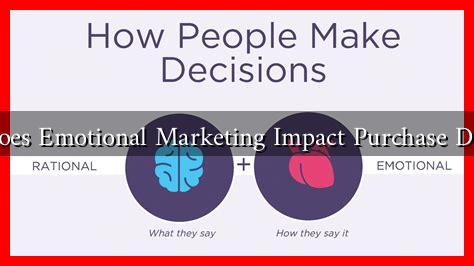-
Table of Contents
How Does Emotional Marketing Impact Purchase Decisions?
In today’s competitive marketplace, brands are constantly seeking innovative ways to connect with consumers. One of the most effective strategies is emotional marketing, which leverages the power of emotions to influence purchase decisions. This article explores how emotional marketing impacts consumer behavior, supported by examples, case studies, and statistics.
The Psychology Behind Emotional Marketing
Emotional marketing taps into the psychological aspects of consumer behavior. According to a study by the American Marketing Association, emotions can significantly influence decision-making processes. When consumers feel a strong emotional connection to a brand, they are more likely to make a purchase. This connection can stem from various emotions, including happiness, nostalgia, fear, and even anger.
Types of Emotions Used in Marketing
Marketers often utilize a range of emotions to create compelling campaigns. Here are some common emotions that drive consumer behavior:
- Happiness: Brands often use humor or uplifting messages to evoke joy, making consumers more likely to associate positive feelings with their products.
- Nostalgia: Tapping into fond memories can create a sense of familiarity and comfort, encouraging consumers to purchase products that remind them of the past.
- Fear: Fear-based marketing can be effective, especially in industries like health and safety, where consumers are motivated to act to avoid negative outcomes.
- Belonging: Many brands create a sense of community, making consumers feel like they are part of something larger, which can drive loyalty and repeat purchases.
Case Studies: Successful Emotional Marketing Campaigns
Several brands have successfully harnessed emotional marketing to boost their sales and strengthen their brand identity. Here are a few notable examples:
- Always – #LikeAGirl: This campaign aimed to empower young girls and challenge gender stereotypes. By evoking feelings of empowerment and self-worth, Always not only increased brand awareness but also fostered a strong emotional connection with its audience.
- Coca-Cola – Share a Coke: Coca-Cola’s campaign personalized its product by replacing its logo with popular names. This simple yet effective strategy created a sense of belonging and connection, leading to a significant increase in sales.
- Google – Year in Search: Google’s annual recap videos evoke nostalgia and reflection, reminding viewers of significant moments throughout the year. This emotional resonance strengthens brand loyalty and encourages users to engage with Google’s services.
The Impact of Emotional Marketing on Purchase Decisions
Emotional marketing can significantly influence purchase decisions in several ways:
- Increased Brand Loyalty: When consumers feel emotionally connected to a brand, they are more likely to remain loyal, even in the face of competition.
- Higher Conversion Rates: Emotional appeals can lead to higher conversion rates, as consumers are more likely to act when they feel a strong emotional response.
- Willingness to Pay More: Consumers often justify paying a premium for products that resonate with them emotionally, as they perceive added value in their connection to the brand.
Statistics Supporting Emotional Marketing
Research supports the effectiveness of emotional marketing. According to a study by McKinsey & Company, emotionally connected customers are more than twice as valuable as highly satisfied customers. Additionally, a report from HubSpot found that 55% of consumers are more likely to buy from brands that share their values, highlighting the importance of emotional alignment.
Conclusion
Emotional marketing is a powerful tool that can significantly impact purchase decisions. By understanding the psychology behind consumer emotions and leveraging them effectively, brands can create meaningful connections with their audience. Successful campaigns demonstrate that when consumers feel an emotional bond with a brand, they are more likely to become loyal customers, leading to increased sales and brand advocacy. As the marketplace continues to evolve, emotional marketing will remain a crucial strategy for brands looking to stand out and resonate with consumers.

